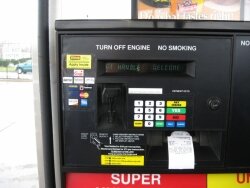Fill 'er up: Gas tax reduction no help to consumers
Virginia drivers may have expected gas prices to drop after July 1, the date the state eliminated the 17.5-cent-per-gallon retail sales tax, but at least here in Charlottesville, they've been sorely disappointed as prices at the pump are holding steady.
"Who is getting all that extra money? That's the question," says Peter Gfrerer, an area driver looking for an explanation.
Indeed, it wasn't just wishful thinking that had Virginia drivers believing there might be a dip in price— even a small one. Auto industry and travel organization AAA predicted that the change in Virginia's tax structure— the drop of the 17.5-cent retail tax and the implementation of a 3.5 percent wholesale gas tax, which, at the current prices, translates into about 11 cents per gallon— should result in a six-cent-per-gallon decrease.
Instead, while the statewide average has dropped the expected six cents per gallon, Charlottesville gas prices remained level from June through July 8 at $3.28 per gallon, according to data posted on the AAA fuel price tracking site fuelgaugereport.com. Though less than the state average of $3.33 per gallon, Charlottesville gas prices are still no bargain.
According to one gas company executive, Charlottesville pricing is slightly lower overall than larger Virginia metropolitan areas because of the type of gas we use.
"There are two 'flavors' of gas," explains Richmond-based Tracy Amburgey, vice president of fuel purveyor Southern States. The Charlottesville market primarily uses "conventional gas with ethanol," while Richmond, Virginia Beach, and other larger markets use the cleaner burning "gas reformulated with ethanol." The former runs about 10 cents cheaper per gallon.
Amburgey says one reason prices may be holding steady rather than dropping in some markets, including Charlottesville, is because "the crude oil and gasoline prices went up." He cites the unrest in Egypt as the basis for the crude oil price increase and says that if crude oil and gasoline prices remained level, then, "in theory," prices at the pump would have decreased after July 1.
David Sutton, president of Tiger Fuel, Central Virginia's largest local distributor of petroleum, says gas pricing is a complex formulation, and he also cites the unrest in Egypt— along with high demand and the price of ethanol— for higher wholesale prices, specifically for the conventional gasoline used in Charlottesville, which has gone up 14 cents since July 4.
That's small consolation for Gfrerer. "Every time something happens in the Middle East," he says, "the price at the pump goes up very quickly, and yet it never seems to go back down."
Compounding the feelings of frustration is the fact that Virginia raised its sales tax on everything except food and medicine from 5 percent to 5.3 percent, another effort to generate funds for transportation costs, such as building roads and bridges. So not only are consumers not paying less at the pump, they're paying more for items virtually everywhere else as well.
Gfrerer says he doesn't mind paying a bit more if it means improved roads and travel, but he'd like assurance that that's where the money is going, and he references a 2010 state audit that revealed more than $1 billion of unspent transportation funding.
"I'm all for fixing infrastructure," he says, "but who is keeping an eye on the fixer?"
